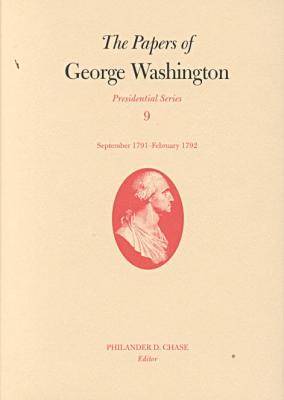The Papers of George Washington: Presidential
3 total works
The Papers of George Washington v.9; Presidential Series;September 1791-February 1792
by George Washington
n the period covered by volume 9, the fall and winter of 1791-92, Washington was busy dealing with a host of issues. Over forty letters to and from Washington between November 1791 and February 1792 concern the problems arising from Pierre L'Enfant's high-handedness as designer of the Federal City, particularly his destruction of the house of Daniel Carroll of Duddington, and L'Enfant's insistence that he not take orders from the Commissioners for the District of Columbia but receive his authority from Washington directly. Washington's nomination in late December 1791 of Thomas Pinckney, Gouverneur Morris, and William Short as ministers at London, Paris, and the Hague, respectively, set off a firestorm of congressional controversy about the meaning of the "advice and consent" provision of the Constitution. Washington believed that the Senate was required either to accept or reject his nominees, while many congressional leaders, who disliked the idea of a fixed diplomatic establishment, argued that only Congress could decide where or if the United States was to appoint resident ministers abroad. Although Washington eventually secured the appointment of Pinckney, Morris, and Short, the disagreement between the Senate and the administration over their relative authority, as well as the practical meaning of the constitutional provision, remained to be settled. In the wake of General Arthur St. Clair's defeat on 4 November, Washington and his secretary of war, Henry Knox, attempted to induce Congress to increase the size of the army, and they sought to rally popular support for yet another punitive expedition against the warring Indian tribes on the northwest frontier of the United States. To do so, in January 1792 Washington instructed Knox to prepare a statement, based on official government documents, revealing the causes of the Indian war and the administration's efforts to pacify the frontier region. Its publication, the preface to which took the form of a letter from Washington to Knox instructing the secretary of war to make the government's case to the American people, represents and early presidential effort to guide the public opinion an win popular support for a controversial policy.
The Papers of George Washington v.3; June-Sept, 1789;June-Sept, 1789
by George Washington

